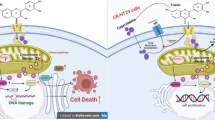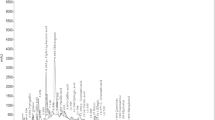Abstract
Growth arrest and DNA damage inducible 45 alpha (GADD45α) is a central player in mediating apoptosis induced by a variety of stress stimuli and genotoxic agents. Regular usage of nonselective nonsteroidal anti-inflammatory drugs (NSAIDs) such as indomethacin and sulindac is associated with reduced risk for various cancers, including colon cancer. The role of GADD45α in NSAID-induced colon cancer cell cytotoxicity is unknown. In this study, we report that indomethacin and sulindac sulfide treatments up-regulate GADD45α mRNA expression and protein levels in colon cancer HT-29, RKO and Caco-2 cells. This up-regulation of GADD45α is accompanied by necrotic cell death and apoptosis. Anti-sense suppression of GADD45α expression inhibited indomethacin and sulindac sulfide-induced necrotic cell death and apoptosis. These findings confirm a role for GADD45α in NSAID-induced cytotoxicity, a mechanism for the anti-neoplastic effect of NSAIDs in colon tumorigenesis and cancer growth.






Similar content being viewed by others
References
Fornace AJ Jr, Nebert DW, Hollander MC et al (1989) Mammalian genes coordinately regulated by growth arrest signals and DNA-damaging agents. Mol Cell Biol 9:4196–4203
Abdollahi A, Lord KA, Hoffman-Liebermann B et al (1991) Sequence and expression of a cDNA encoding MyD118: a novel myeloid differentiation primary response gene induced by multiple cytokines. Oncogene 6:165–167
Beadling C, Johnson KW, Smith KA (1993) Isolation of interleukin 2-induced immediate-early genes. Proc Natl Acad Sci USA 90:2719–2723. doi:10.1073/pnas.90.7.2719
Zhan Q (2005) GADD45A, a p53- and BRCA1-regulated stress protein, in cellular response to DNA damage. Mutat Res 569:133–143. doi:10.1016/j.mrfmmm.2004.06.055
Hollander MC, Sheikh MS, Bulavin DV et al (1999) Genomic instability in Gadd45a-deficient mice. Nat Genet 23:176–184. doi:10.1038/13802
Naito Y, Kajikawa H, Mizushima K et al (2005) Rebamipide, a gastro-protective drug, inhibits indomethacin-induced apoptosis in cultured rat gastric mucosal cells: association with the inhibition of growth arrest and DNA damage-induced 45 alpha expression. Dig Dis Sci 50(Suppl 1):S104–S112. doi:10.1007/s10620-005-2814-3
Hollander MC, Kovalsky O, Salvador JM et al (2001) Dimethylbenzanthracene carcinogenesis in Gadd45a-null mice is associated with decreased DNA repair and increased mutation frequency. Cancer Res 61:2487–2491
Zerbini LF, Wang Y, Czibere A et al (2004) NF-kappa B-mediated repression of growth arrest- and DNA-damage-inducible proteins 45alpha and gamma is essential for cancer cell survival. Proc Natl Acad Sci USA 101:13618–13623. doi:10.1073/pnas.0402069101
Hildesheim J, Bulavin DV, Anver MR et al (2002) Gadd45a protects against UV irradiation-induced skin tumors, and promotes apoptosis and stress signaling via MAPK and p53. Cancer Res 62:7305–7315
Thun MJ (1994) Aspirin, NSAIDs, and digestive tract cancers. Cancer Metastasis Rev 13:269–277. doi:10.1007/BF00666097
Giardiello FM (1994) Sulindac and polyp regression. Cancer Metastasis Rev 13:279–283. doi:10.1007/BF00666098
Vane JR, Botting RM (1998) Mechanism of action of nonsteroidal anti-inflammatory drugs. Am J Med 104:2S–8S. doi:10.1016/S0002-9343(97)00203-9 discussion 21S–22S. Review
Leung WK, Bai AH, Chan VY et al (2004) Effect of peroxisome proliferator activated receptor gamma ligands on growth and gene expression profiles of gastric cancer cells. Gut 53:331–338. doi:10.1136/gut.2003.021105
Jayadev S, Hayter HL, Andrieu N et al (1997) Phospholipase A2 is necessary for tumor necrosis factor alpha-induced ceramide generation in L929 cells. J Biol Chem 272:17196–17203. doi:10.1074/jbc.272.27.17196
Wang J, Lv X, Shi J et al (2006) Ceramide induces apoptosis via a peroxisome proliferator-activated receptor gamma-dependent pathway. Apoptosis 11:2043–2052. doi:10.1007/s10495-006-0191-9
Scorrano L, Penzo D, Petronilli V et al (2001) Arachidonic acid causes cell death through the mitochondrial permeability transition. Implications for tumor necrosis factor-alpha apoptotic signaling. J Biol Chem 276:12035–12040. doi:10.1074/jbc.M010603200
Yin MJ, Yamamoto Y, Gaynor RB (1998) The anti-inflammatory agents aspirin and salicylate inhibit the activity of I (kappa) B-kinase-beta. Nature 396:77–80. doi:10.1038/23948
Wong BC, Jiang X, Fan XM et al (2003) Suppression of RelA/p65 nuclear translocation independent of IkappaB-alpha degradation by cyclooxygenase-2 inhibitor in gastric cancer. Oncogene 22:1189–1197. doi:10.1038/sj.onc.1206234
Zhou XM, Wong BC, Fan XM et al (2001) Non-steroidal anti-inflammatory drugs induce apoptosis in gastric cancer cells through up-regulation of bax and bak. Carcinogenesis 22:1393–1397. doi:10.1093/carcin/22.9.1393
Ho CC, Yang XW, Lee TL et al (2003) Activation of p53 signalling in acetylsalicylic acid-induced apoptosis in OC2 human oral cancer cells. Eur J Clin Invest 33:875–882. doi:10.1046/j.1365-2362.2003.01240.x
Chiou SK, Tanigawa T, Akahoshi T et al (2005) Survivin: a novel target for indomethacin-induced gastric injury. Gastroenterology 28:63–73. doi:10.1053/j.gastro.2004.10.008
Zerbini LF, Czibere A, Wang Y et al (2006) A novel pathway involving melanoma differentiation associated gene-7/interleukin-24 mediates nonsteroidal anti-inflammatory drug-induced apoptosis and growth arrest of cancer cells. Cancer Res 66:11922–11931. doi:10.1158/0008-5472.CAN-06-2068
Chen Z, Clark S, Birkeland M et al (2002) Induction and superinduction of growth arrest and DNA damage gene 45 (GADD45) alpha and beta messenger RNAs by histone deacetylase inhibitors trichostatin A (TSA) and butyrate in SW620 human colon carcinoma cells. Cancer Lett 188:127–140. doi:10.1016/S0304-3835(02)00322-1
Li X, Ding X, Adrian TE (2004) Arsenic trioxide causes redistribution of cell cycle, caspase activation, and GADD expression in human colonic, breast, and pancreatic cancer cells. Cancer Invest 22:389–400. doi:10.1081/CNV-200029068
Bhattacharjee RN, Park KS, Uematsu S et al (2005) Escherichia coli verotoxin 1 mediates apoptosis in human HCT116 colon cancer cells by inducing overexpression of the GADD family of genes and S phase arrest. FEBS Lett 579:6604–6610. doi:10.1016/j.febslet.2005.10.053
Williams CS, Goldman AP, Sheng H et al (1999) Sulindac sulfide, but not sulindac sulfone, inhibits colorectal cancer growth. Neoplasia 1:170–176. doi:10.1038/sj.neo.7900024
Bottone FG Jr, Martinez JM, Collins JB et al (2003) Gene modulation by the cyclooxygenase inhibitor, sulindac sulfide, in human colorectal carcinoma cells: possible link to apoptosis. J Biol Chem 278:25790–25801. doi:10.1074/jbc.M301002200
Pfaffl MW (2001) A new mathematical model for relative quantification in real-time RT-PCR. Nucleic Acids Res 29:e45. doi:10.1093/nar/29.9.e45
Zhang T, Fields JZ, Ehrlich SM et al (2004) The chemopreventive agent sulindac attenuates expression of the antiapoptotic protein survivin in colorectal carcinoma cells. J Pharmacol Exp Ther 308:434–437. doi:10.1124/jpet.103.059378
Chiou SK, Mandayam S (2007) NSAIDs enhance proteasomic degradation of survivin, a mechanism of gastric epithelial cell injury and apoptosis. Biochem Pharmacol 74:1485–1495. doi:10.1016/j.bcp.2007.07.024
Elmore S (2007) Apoptosis: a review of programmed cell death. Toxicol Pathol 35:495–516. doi:10.1080/01926230701320337
Thun MJ, Henley SJ, Patrono C (2002) Nonsteroidal anti-inflammatory drugs as anticancer agents: mechanistic, pharmacologic, and clinical issues. Natl Cancer Inst 94:252–266
Hull MA, Gardner SH, Hawcroft G (2003) Activity of the non-steroidal anti-inflammatory drug indomethacin against colorectal cancer. Cancer Treat Rev 29:309–320. doi:10.1016/S0305-7372(03)00014-8
Dronamraju SS, Coxhead JM, et al. (2008) Cell kinetics and gene expression changes in colorectal cancer patients given resistant starch—a randomised controlled trial. Gut 2008(Oct):31. Epub ahead of print
Lal A, Gorospe M (2006) Egad, more forms of gene regulation: the gadd45a story. Cell Cycle 5:1422–1425
Zhan Q, Chen IT, Antinore MJ et al (1998) p53 can participate in transcriptional induction of the GADD45 promoter in the absence of direct DNA binding. Mol Cell Biol 18:2768–2778
Liu HF, Hsiao PW, Chao JI (2008) Celecoxib induces p53-PUMA pathway for apoptosis in human colorectal cancer cells. Chem Biol Interact 176:48–57. doi:10.1016/j.cbi.2008.07.012
Moon Y, Bottone FG Jr, McEntee MF et al (2005) Suppression of tumor cell invasion by cyclooxygenase inhibitors is mediated by thrombospondin-1 via the early growth response gene Egr-1. Mol Cancer Ther 4:1551–1558. doi:10.1158/1535-7163.MCT-05-0213
Thyss R, Virolle V, Imbert V et al (2005) NF-kappaB/Egr-1/Gadd45 are sequentially activated upon UVB irradiation to mediate epidermal cell death. EMBO J 24:128–137. doi:10.1038/sj.emboj.7600501
Acknowledgements
This work was funded by the Department of Veterans Affairs Merit Review Grant and the Southern California Institute of Research and Education Small Grant to S.-K.C.
Author information
Authors and Affiliations
Corresponding author
Rights and permissions
About this article
Cite this article
Chiou, SK., Hoa, N. Up-regulation of GADD45α expression by NSAIDs leads to apoptotic and necrotic colon cancer cell deaths. Apoptosis 14, 1341–1351 (2009). https://doi.org/10.1007/s10495-009-0399-6
Published:
Issue Date:
DOI: https://doi.org/10.1007/s10495-009-0399-6




